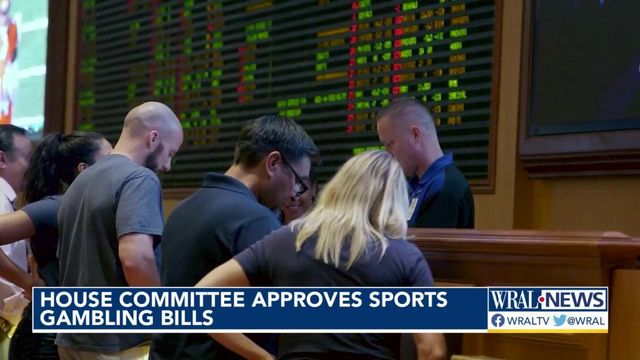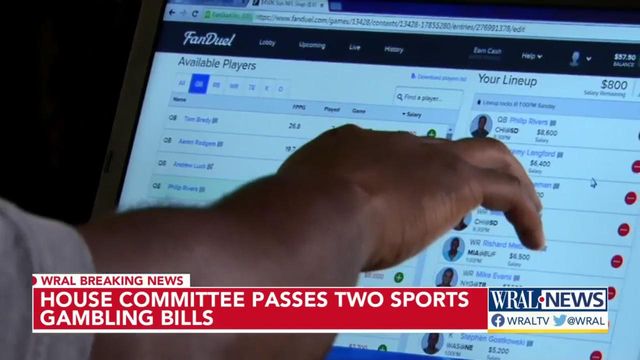House panel advances bills to legalize online sports gambling in NC
If the bills are signed into law, legalized online sports gambling would begin as early as Jan. 1. The proposed legislation would authorize gambling on professional, college and electronic sports.
Posted — UpdatedThe bills are scheduled for two more House committees Wednesday and could be before the full chamber for votes as soon as Wednesday night.
The legislation authorizes gambling on professional, college and electronic sports, as well as horse racing. Taking bets on youth sports, defined as events in which the majority of competitors are under 18 or are competing on behalf of preschool, elementary, middle or secondary schools, isn’t permitted under the legislation.
Supporters of the legislation have said they have the votes to pass the bills this year, though there are critics of legalized sports gambling in the Republican and Democratic caucuses.
"I think we're going way too fast," Rep. Marcia Morey, D-Durham, a former U.S. Olympic swimmer who worked in NCAA enforcement, told WRAL News before Tuesday's hearing. She is not a member of the committee. "If we maybe took a step at looking at the big sports facilities having in-person betting. But to suddenly put it on everyone's mobile phone, to have access to instant wagering every 10 seconds on different aspects of sports, I just think it's a bad idea."
If the bills pass the House, the Senate would still have to concur with the changes made to SB 38. But that bill wouldn’t have to go through Senate committees.
Lawmakers have targeted the end of June to wrap up the current session. They wouldn’t meet again until January, barring a special session. Gov. Roy Cooper has said he supports legalizing sports gambling and would sign the legislation.
Sens. Jim Perry, R-Lenoir, and Paul Lowe, D-Forsyth, are the sponsors of the Senate bills. Reps. Jason Saine, R-Lincoln, Jon Hardister, R-Guiflord, and Zack Hawkins, D-Durham, are the House sponsors of companion legislation.
Rep. Ted Davis, the chairman of the House Judiciary Committee, announced in a letter to House members last week that he was postponing the hearing because he had tested positive for COVID-19. He appeared at the Tuesday hearing via video and abstained from both votes.
Saine presided over the hearing. He didn't allow public comments on the bill, despite many people having signed up to speak. Saine didn't allow amendments on SB 688. Rep. Pricey Harrison, D-Guilford, said she planned to have two amendments on the bill—one to stop betting on college sports and one to prohibit the use of credit cards in creating accounts.
"One thing we know is the house always wins in gambling, not our state, not our people," said Harrison, who voted against both bills in committee. "I cannot stress more strongly how upset I am about this bill and what terrible policy it is."
The Charlotte Hornets, Carolina Hurricanes and Carolina Panthers, along with Charlotte Motor Speedway, support the legislation. The state’s top athletic colleges have stayed quiet on the proposed legislation.
Sports betting is currently legal in North Carolina, but only at a physical casino. Two Cherokee casinos in the far western part of the state accept sports wagers currently. The Eastern Band of Cherokee Indians and the Catawba can apply for online licenses, but those wouldn’t count toward the total number of operators in the state.
More than 20 states allow online sports betting, including Virginia, Tennessee. Under the proposed North Carolina law, at least 10 and up to 12 online operators would be licensed to take bets from adults located within the state’s borders. Initial projections indicated the state could collect between $8 million and $24 million per year in tax revenue, but those figures would rise if lawmakers adopt higher tax rates as proposed in the second bill.
After expenses for the Department of Revenue and the N.C. Lottery Commission, the first $2 million in tax collected would go to the Department of Health and Human Services for gambling addiction education and treatment programs.
After that the revenue is split 50-50 between a newly created North Carolina Major Events, Games, and Attractions Fund and the state’s General Fund. The major events fund would be used to bring major sporting events to the state. Local entities can apply for a grant from the fund. To qualify for a grant, the event must be held at a NASCAR track, golf course with a professional event that attracts more than 50,000 live spectators, or the home location of a professional sports team in MLB, MLS, the NBA, the NFL or the NHL.
Perry said Tuesday that lawmakers are considering lowering the percentage of revenue that goes to the major events fund.
A 2018 U.S. Supreme Court decision opened the door for the majority of states to allow sports gambling. In Virginia this year, more than $400 million per month is being bet through sports gambling operators. In New York, operators have taken about $7.5 billion in bets through the first five months of the year.
"Should we here in this legislature approve gambling because Tennessee and Virginia do it? No," said Rep. Abe Jones, D-Wake, who voted no in committee. "We should do it based on what our values are. ... These are not my values."
Jones said he believes that gambling is wrong. He said from the time he was a small child, his father told him: "Don't gamble. Don't gamble, son. It's a waste of money."
Related Topics
• Credits
Copyright 2024 by Capitol Broadcasting Company. All rights reserved. This material may not be published, broadcast, rewritten or redistributed.






